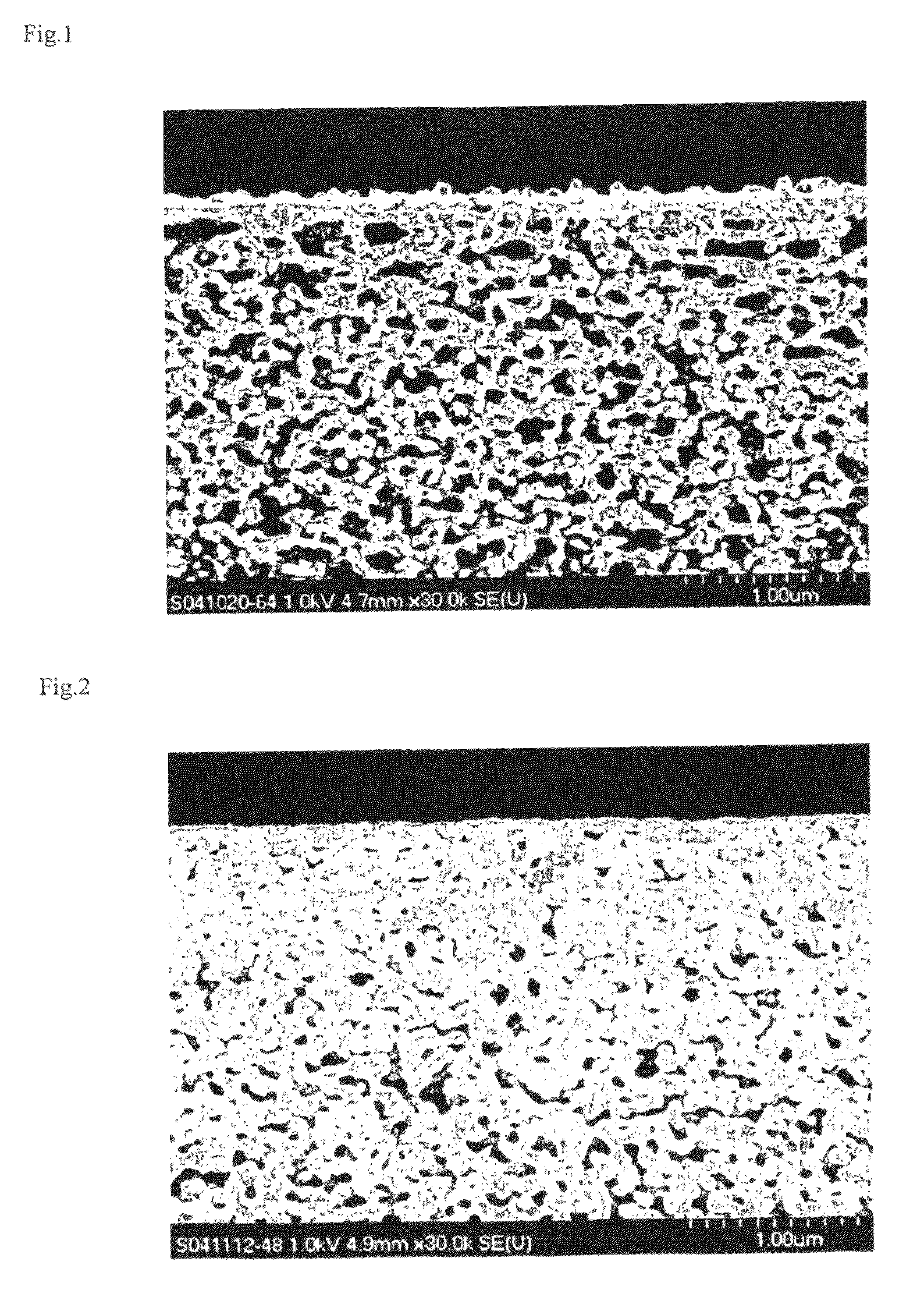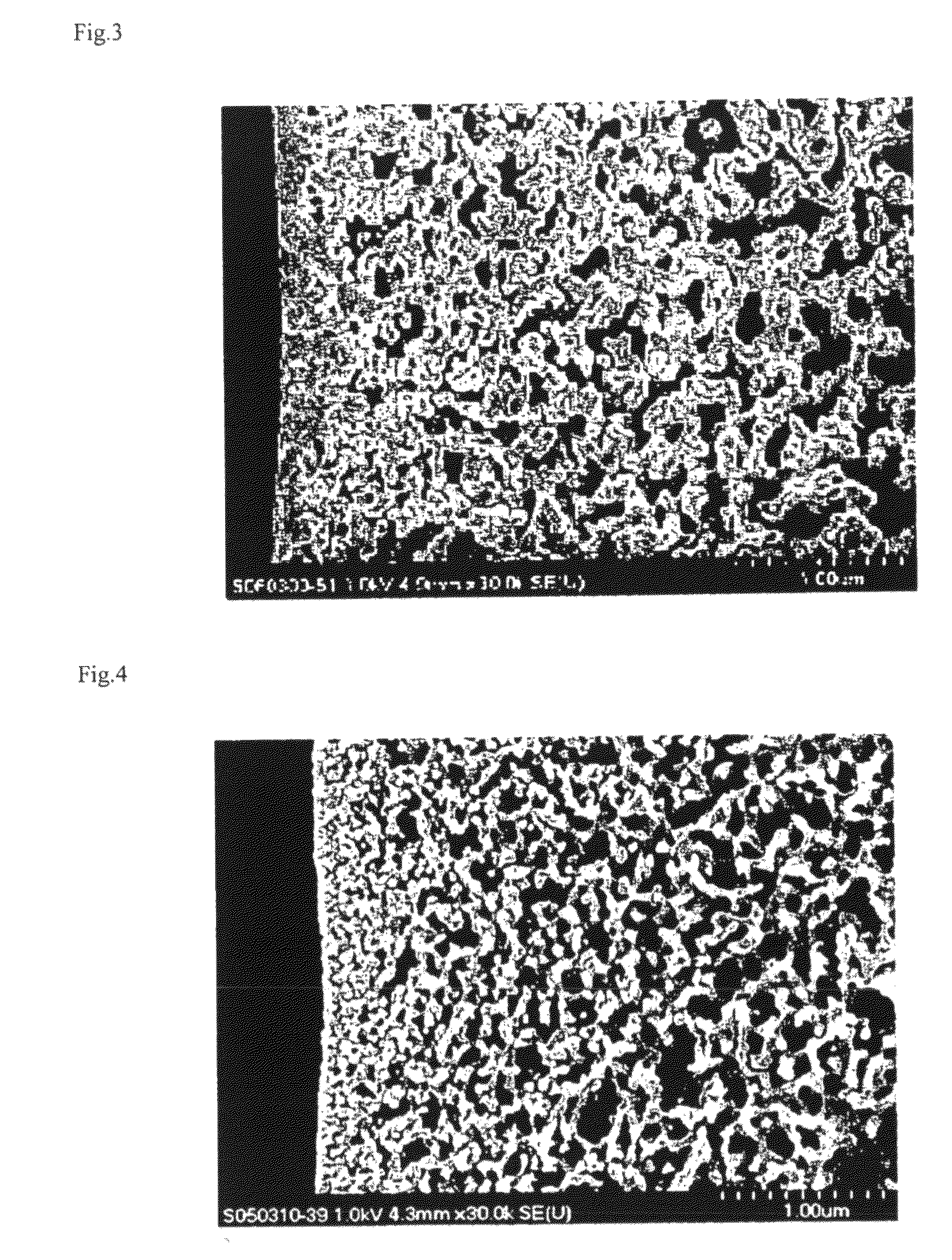Separation membrane for use in treatment of liquid comprising aromatic ether polymer hydrophilized with hydrophilizing agent
a technology of hydrophilic agent and separation membrane, which is applied in the field of separation membrane, can solve the problems of reducing physical strength, reducing solvent resistance, and adsorption and denaturation depending on materials, and achieves the effects of less deterioration, controlled pores, and high water permeability
- Summary
- Abstract
- Description
- Claims
- Application Information
AI Technical Summary
Benefits of technology
Problems solved by technology
Method used
Image
Examples
preparation example 1
Membrane Preparation Example 1
Preparation of Flat Membrane
[0125]1.6 g of poly(2,6-dimethylphenylene-1,4-oxide) (Sigma Aldrich Japan, Inc., hereinafter abbreviated as “PPE”) and 0.4 g of a hydrophilizing agent were added to 8.0 g of N-methyl-2-pyrrolidone (first grade reagent with a purity of 97%, Wako Pure Chemical Industries, Ltd., hereinafter abbreviated as “NMP”), and the mixture was heated and dissolved at 160° C. for one hour. Thereafter, a polymer solution at 90° C. was obtained. The polymer solution was gently dropped onto a glass plate heated at 90° C. and uniformly spread using an applicator, immediately followed by immersion into a coagulating liquid (purified water) heated at 90° C. The polymer precipitated at once to form a white flat membrane. The flat membrane was immersed in and washed with purified water at 90° C. five times, and dried using a hot air dryer at 70° C. for six hours.
[0126]When preparing a membrane for treating liquid with a different membrane structure...
preparation example 2
Membrane Preparation Example 2
Preparation of Hollow Fiber Membrane
[0127]320 g of PPE and 110 g of hydrophilizing agent were added to 1,600 g of NMP, the mixture as a dispersion solution was poured into a 5,000×10−6 m3 reactor for the casting / spinning solution. A procedure of reducing the pressure to 0.02 MPa, followed by replacing the atmosphere with nitrogen while stirring the reactor was repeated five times. The internal temperature of the reactor was then increased to 160° C. to obtain a homogeneous NMP solution of PPE. At this stage, stirring was stopped and the internal temperature of the reactor was decreased to 90° C. over one hour, while maintaining the internal pressure of the reactor at 0.02 MPa as-is. Then, the internal pressure of the reactor was increased to atmospheric pressure with nitrogen to obtain a casting / spinning solution for spinning which was maintained at 90° C.
[0128]500 g of purified water was mixed with 500 g of NMP, and the mixture was added to a 3,000×10−...
example 1
[0163]A flat membrane was prepared according to the Membrane Preparation Example 1 by using PPE and polyethylene glycol (number average molecular weight: 4,000, Wako Pure Chemical Industries, Ltd., hereinafter referred to as “PEG”) as a hydrophilizing agent.
[0164]The membrane thickness was 178 μm, porosity was 78%, water permeability was 35.0×10−7 (m3 / (hr·m2·Pa)), and the maximum pore diameter was 132 nm. The contact angle with water was 87°, and the surface coating rate of hydrophilizing agent of the membrane was 14%. The surface coating rate of the hydrophilizing agent after immersion in ethanol was 6%, indicating that the hydrophilizing agent was remained on the surface to maintain hydrophilicity of the membrane. The results are shown in Table 1.
[0165]The SEM photograph of the membrane cross-section is shown in FIG. 1.
PUM
| Property | Measurement | Unit |
|---|---|---|
| pore size | aaaaa | aaaaa |
| surface pore size | aaaaa | aaaaa |
| size | aaaaa | aaaaa |
Abstract
Description
Claims
Application Information
 Login to View More
Login to View More - R&D
- Intellectual Property
- Life Sciences
- Materials
- Tech Scout
- Unparalleled Data Quality
- Higher Quality Content
- 60% Fewer Hallucinations
Browse by: Latest US Patents, China's latest patents, Technical Efficacy Thesaurus, Application Domain, Technology Topic, Popular Technical Reports.
© 2025 PatSnap. All rights reserved.Legal|Privacy policy|Modern Slavery Act Transparency Statement|Sitemap|About US| Contact US: help@patsnap.com



